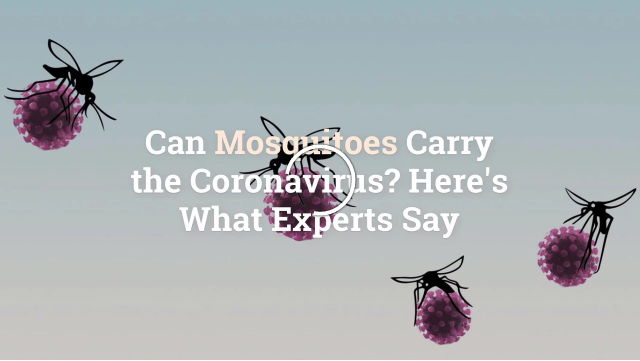Short answer: It is unlikely. Official guidance from the World Health Organization (WHO) states that there is no information or evidence to suggest the new coronovirus has been infected with mosquito bites.
For starters, the coronavirus is a respiratory virus, and the main mode of transmission is when viral droplets are released into the air when an infected person coughs or sneezes. To become infected with a mosquito virus, it must be present in the blood on which the mosquito feeds.
"SARS-CoV2 (the virus that causes COVID-19) is a respiratory virus that occurs almost exclusively within the lungs and respiratory tracts of infected people, and is rarely found in the blood," Emily Gallicott, PhD, A postdoctoral researcher tells the Department of Microbiology, Immunology and Pathology Health at Colorado State University.
In addition, for a virus to pass through a mosquito or other type of insect bite - such as a tick bite - the virus must be able to replicate inside a mosquito or tick. Neither the new coronavirus nor any other type of coronavirus has been shown to do so.
"It's quite a complicated process," former US Navy entomologist Joseph M. Conlon, who has extensive worldwide experience in mosquito control and is a technical advisor to the American Mosquito Control Association (AMCA), tells Health. “First, the mosquito must select the expected amount of virus during its bite. The virus must then not only avoid the digestive process, but also replicate within the mosquito and pass through the gut wall to the mosquito's coelom (main body cavity). From there it must make its way to the salivary glands and be expressed by the mosquito as part of its salivary glands. "
In addition, mosquitoes differ very genetically from humans. "It's challenging for the virus to have the ability to infect both of us," Gallicott says. "We have different receptors on the surface of cells and different replication machinery inside our cells."
Relatively few human viruses have the ability to infect both humans and mosquitoes. "The vast majority of human viruses (such as influenza, HIV and herpes) have been infecting humans for a very long time, and even though many of these have ended up in our blood, they are still unable to infect mosquitoes , "Gallichotte. “In contrast, there are many mosquito viruses that are unable to infect humans, or any mammal. There are no known coronaviruses to infect mosquitoes. "
Viruses spread by mosquitoes to humans include the West Nile virus, dengue fever-causing virus, and chikungunya virus, which all spread to the blood of infected people. "The West Nile virus is capable of infecting a mosquito to the point where the salivary glands have abundant loads of virus," said Melissa Doyle, scientific program manager at the San Gabriel Valley Mosquito and Vector Control District (SGVVVCD). "When a mosquito bites a person, the virus is able to travel from the salivary glands to the human body."
So it is very clear that COVID-19 is the last thing you should worry about if a mosquito is feasting on your feet. However, continue swatting them away. "Because of the heavy focus on COVID-19, many people may forget that the risk of the disease may already be outside your window." SGVMVCD public information officer Levi Sun tells Health.
Conlan explains that mosquitoes can cause COVID-19 severity, meaning that it is important to maintain robust measures to reduce their numbers. "Studies have shown that factors that may be involved in the potentially serious or fatal consequences of COVID-19 infection include underlying medical issues, such as neurologic conditions that cause coughing or weakened pre-stressed immune systems due to concurrent infections by mosquito-borne viruses. Does, "he says.
It is still important to follow healthy coronavirus protocols to protect yourself and others from mosquitoes or mosquitoes, COVID-19. Clean your hands frequently, practice social disturbances, stay home if you are sick, and avoid close contact with whoever is coughing and sneezing.
The information in this story is accurate as of press time. However, as the situation around COVID-19 continues to evolve, it is possible that some data may have changed since publication. While Health is trying to keep our stories as up to date as possible, we encourage readers to stay informed on news and recommendations for their own communities using the CDC, WHO and their local public health department as resources .
![Author Image]()







No comments:
Post a Comment